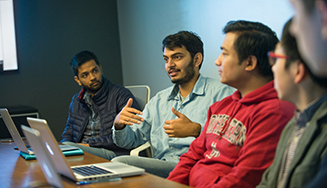Get Involved: Potential PhD Students
|
Are you looking to join a doctoral program and learn how to do research? Do you like being the first one to solve a problem nobody else in the world has solved before? Research careers can be wonderfully fulfilling, both in academia and industry.
We are recruiting new PhD students for the fall of 2024. For priority consideration, applicants must complete an application by Dec 15, 2023. Doctoral students can work with our group either as a PhD in Personal Health Informatics student, a PhD in Computer Science student, or a PhD in Population Health student. Potential students must meet the admissions criteria of one of these competitive programs. Most prospective students will have a strong preference for one program over the other. The best degree program for you should be an easy decision. You can do the same research in any of the programs, but the course requirements are quite different. The PhD in Personal Health informatics is an interdisciplinary degree requiring more coursework in health informatics and human-computer interaction. The PhD in Computer Science requires more coursework in computer science and data science. The PhD in Population Health does not require any background in technology and is fully focused on topics and research methods in public health. If you are admitted into any of these programs as a full-time student, it will be with funding. Funding includes your tuition and a stipend. Applicants to any of the programs are asked to provide all prior academic transcripts, a statement of purpose indicating why the applicant wants to go to graduate school and is a strong candidate, GRE scores (some progrmas), and at least three letters of recommendation. Any applicants who have not completed an undergraduate degree at a US institution must also provide a TOEFL score. Successful applicants for the mHealth group typically do the following:
We fully fund all of our graduate students. If you believe you will be self-funded via a government or industry grant of your own (or think you have identified such a source to which you could apply), send Dr. Intille your CV and information on the nature of your proposed scholarship to start a discussion before you apply. We are especially interested in mentoring students who are underrepresented in computer science such as women and persons of color, as well as persons with disabilities and U.S. veterans. Prof. Intille will work with applicants before the application deadline who are U.S. citizens and interested in applying for fellowships to support graduate studies at Northeastern (e.g., NSF Graduate Research Fellowship), and so please reach out if you may be eligible to do this. If the December 15th application deadline has passed, but you think you can quickly pull together a full application and apply and that you are a very strong applicant, please still reach out to Prof. Intille. Students frequently send Prof. Intille a CV and ask some version of, "What are my chances for admission?" Unfortunately, it is not possible to respond to these requests. We only evaluate full applications so we can read the CV plus recommendations and a full research statement and test scores so we can get a full picture of an applicant's strengths. Prospective students are welcome and encouraged to send an email with CV indicating that they are interested in the group, but it will not be possible to respond to all these emails. If you are interested in the research group, please submit a full application. At this time, we are especially interested in having new students join us interested in these topics:
|


